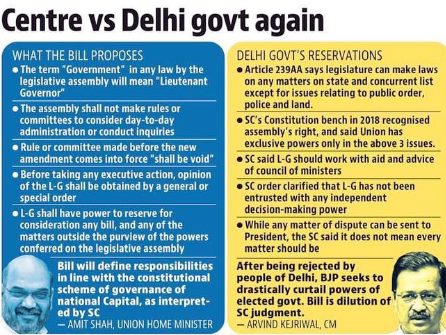Description

Copyright infringement not intended
Context - The Union Government in Supreme Court has stated that Delhi, as the nation’s capital, must remain under its control.
Details
- A three-judge Bench led by the Chief Justice of India started hearing a petition of the Delhi government to suppress the amendments made to the Government of National Capital Territory of Delhi (Amendment) Act or GNCTD Act of 2021.
Key Features of the Government of National Capital Territory of Delhi (Amendment) Act, 2021
- It amended the Government of National Capital Territory of Delhi Act, 1991.
- It provides a framework for the working of the Delhi State Legislative Assembly and the government of the National Capital Territory (NCT) of Delhi.
- It amended certain powers and responsibilities of the Delhi State Legislative Assembly and the Lieutenant Governor.
- The Act highlighted that the term “government” in any law made by the Legislative Assembly will indicate Lieutenant Governor (LG).
- The Act allows the Delhi State Legislative Assembly to make Rules to regulate the procedure and conduct of business in the State Assembly.
- It provides that the Rules must be agreeing with the Rules of Procedure and Conduct of Business in the Lok Sabha.
- The Act prohibits the State Legislative Assembly from making any rule to enable itself or its Committees to:
- Related to the matters of the day-to-day administration of the NCT of Delhi.
- Conduct any inquiry concerning the administrative decisions.
- The Act provides that all such rules made before its enactment will be void.
- The Act requires the LG to reserve certain bills passed by the Legislative Assembly for the consideration of the President. These Bills are;
- Which diminishes the powers of the High Court of Delhi.
- Which the President may direct to be reserved.
- Dealing with the salaries and allowances of the Speaker, Deputy Speaker, and members of the Assembly and the Ministers.
- Relating to official languages of the State Assembly or Delhi government.
- The Act requires the LG to reserve those Bills for the President that incidentally covers any of the matters outside the purview of the powers of the Delhi State Legislative Assembly.
- The Act prescribes that all executive action by the government, whether taken on the advice of the Ministers or otherwise, must be taken in the name of the LG.
- The Act highlighted that on certain matters, LG opinion must be obtained before taking any executive action.
Concern
- The Act undermines the role of the state government.
- The Act will limit the role of the state government.
- These amendments will make LG, the real executive, this goes against the core concept of democracy and also undermine the constitutional values.
- The Delhi government argues that the amendment undermines the constitutionally guaranteed powers and functions of the elected legislative assembly.
- The amendments violate the doctrine of the basic structure of the Constitution.
- The Centre, through its amendments, has given more power to the Lieutenant Governor (LG) than the elected government of the people of Delhi.
Way Forward
- According to Article 239AA of the Constitution of India, the Parliament has the power to amend or form laws on any matter formulated by the Delhi Assembly.
- The Act has been introduced for greater transparency, improved governance and more efficient delivery of civic service for the people of Delhi.
https://www.thehindu.com/news/national/centre-says-delhi-should-be-under-its-control/article65360683.ece













